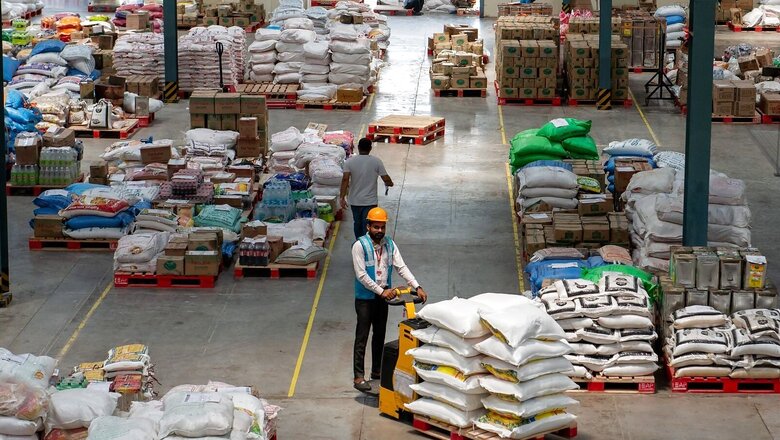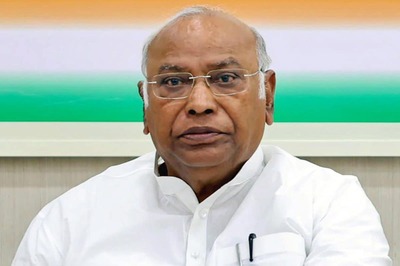
views
Union Budget 2023: Prime Minister Narendra Modi launched the National Logistics Policy (NLP) last year in order to ensure quick last mile delivery, end transport-related challenges, save time and money of the manufacturers, and prevent wastage of the agro-products.
The need for a NLP was felt since the logistics cost in India is high as compared to other developed economies. It is imperative to reduce the logistics cost in India for improving the competitiveness of Indian goods both in domestic as well as export markets.
Reduced logistics cost improves efficiency cutting across various sectors of the economy, encouraging value addition and enterprise.
The Union Budget 2023 will be the first budget after the NLP was announced. Industry is expecting a slew of measures to push the sector in terms of strengthening the infrastructure for logistics and focus on sustainable logistics.
Kami Viswanathan, senior vice president, FedEx Express, Middle East Indian Subcontinent and Africa (MEISA) Operations, shared that while the NLP will be pivotal to the development of the logistics and supply chain ecosystem, FedEx recommends a special focus on air cargo.
“The development and expansion of airports to meet the rapidly growing demand for air cargo capacity and digitised systems to streamline surging cross border shipments, will be essential to ensure seamless freight movement in and from India. A more efficient air express infrastructure will improve global competitiveness, ensure just-in-time deliveries and fuel India’s ambition of becoming a $5 trillion economy by 2025,” Viswanathan said.
Also Read: Budget 2023 Expectations: EdTech Industry Bets For Youth, Collaboration With Universities
Yogesh Patel, CFO, Mahindra Logistics also said that the announcement of NLP clearly laid out the direction to improve efficiency and transparency of operations. Multiple interventions across the logistics ecosystem, that the policy defines, should be adequately funded by the budget so that its effects can be seen in the years to come.
“We are expecting the Union Budget to further the initiatives to support growth of our economy. The budget should continue to prioritise improvement of logistics infrastructure across roads, warehouses and ports,” Patel added.
Experts also underlined that one of the focus areas for the budget can be on enhancing transparency and visibility, which can be attained through the Unified Logistics Interface Platform as and when it is integrated into the system.
Viswanathan highlighted that MSMEs are the growth engines of the Indian economy. Indian small and medium sized businesses are prioritising cross border trade to thrive in the post-pandemic world. FedEx recommends allowing all categories of export and import shipments through express mode.
“We also recommend eliminating value and weight restrictions for clearance under courier regulations. This will further boost exports from India, especially for MSMEs engaged in cross border e-commerce, and increase India’s competitive advantage as a manufacturing hub,” Viswanathan added.
It is important to note that the e-commerce industry in India has seen a rapid rise over the last few years and pandemic has triggered it further.
The Indian e-commerce market is expected to reach $120 billion by 2026, according to a joint report by industry body FICCI and property consultancy Anarock.
It added the rise of e-commerce will fuel the economic growth of the warehousing and logistics sector in the sector.
Furthermore, for the budget, FedEx recommended the implementation of zero rating of Goods and Services Tax for all international transportation services.
Most of the international GST/VAT legislations ‘zero-rate’ international freight transportation services. This would facilitate trade and align India with international tax practices as well as reduce logistics costs, Viswanathan added.
Patel is anticipating that the budget will prioritise strengthening the infrastructure for logistics and related services and advancing connectivity initiatives in various economic zones thus creating an enabling environment for reducing logistics costs and times and boosting productivity and economy.
Viswanathan concluded that the budget should not only create a roadmap for sustainable growth in the logistics sector but also incentivise logistics players to adopt sustainable practices.
The NLP aspires to reduce cost of logistics in India to be comparable to global benchmarks by 2030, endeavour to be among top 25 countries by 2030 in the Logistics Performance Index ranking, and create data driven decision support mechanism for an efficient logistics ecosystem.
Read all the Latest Business News here




















Comments
0 comment